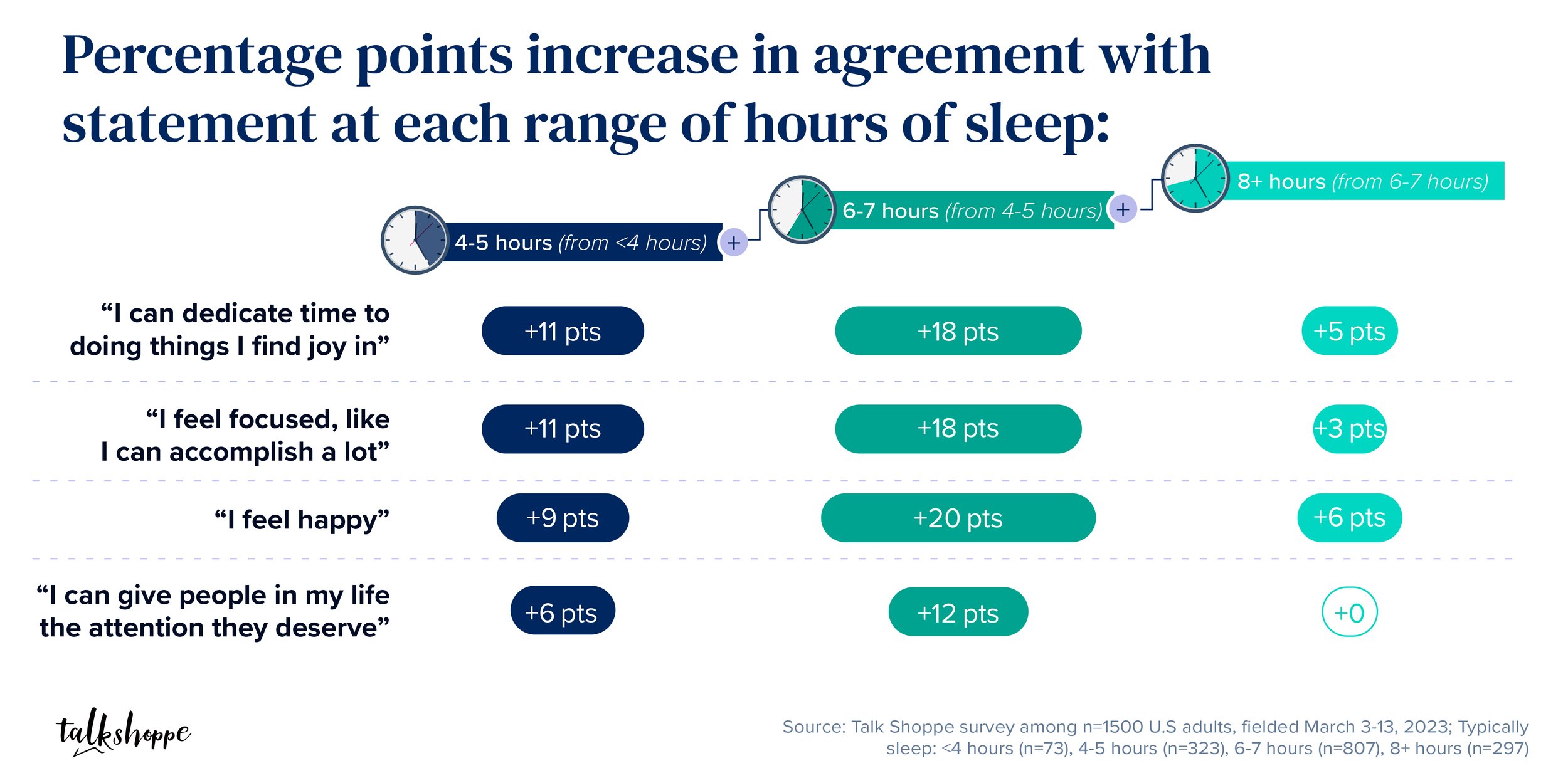Sleep & Mental Health
Anyone who has had a good night's sleep can attest to its restorative powers. You wake up feeling rested and refreshed, and that’s because sleep heals the body, boosts cardiovascular and immune systems, and regulates metabolism. It literally fixes torn muscles, which is why it has been called the “secret ingredient of injury recovery.”
But sleep restores more than just your physical health. Our data shows that plentiful sleep is essential for your mental health as well.
There’s a direct relationship between number of hours slept and feelings of happiness. Put simply: the more people sleep, the happier they feel. Nearly two-thirds (64%) of people who typically sleep 8 or more hours a night say they feel happy during the day. Compare that to the other end of the spectrum: less than a third (29%) of people who typically sleep less than 4 hours a night report feeling happy during the day. More sleep also leads to lower reported feelings of crabbiness, irritability, and anger throughout the day.
More plentiful sleep also translates to greater focus and a feeling of accomplishment during the day. About 6-in-10 (59%) people who typically sleep 8 or more hours a night say they feel focused and that they can accomplish a lot during the day. Again, people on the other end of the sleep spectrum differ greatly on this metric: just over a quarter (27%) of people who typically sleep less than 4 hours a night report feeling this level of focus and accomplishment during the day.
Getting more sleep helps people make the best of their time during the day. They create more quality time both for themselves and for loved ones. Over two-thirds of people (68%) who typically sleep 8 or more hours a night say that they are able to dedicate time to doing the things they find joy in during the day, like hobbies or personal projects. A nearly-identical proportion (67%) say they are able to give the people in their lives the attention they deserve, including their partner, children, or pets. A significantly lower proportion of people who typically sleep 4-5 hours or less a night agrees with both statements.
Part of the reason why longer sleep has a positive impact on mental health is because the last stage of sleep is when more mental recovery and healing occur.
So does this mean that getting more hours of sleep is always better? Yes, but there is also potentially a point of diminishing returns.
We think the experts should say: “Get more sleep, but don’t fret over eight”. It is unquestionable from the data presented above that people who typically get 8 or more hours a day - long touted as the ideal number of sleep hours in popular culture - show signs of better mental health during the day. However, the incremental impact of each additional hour of sleep does appear to decline once people get to 6-7 hours. For example, the difference in self-reported feelings of happiness (i.e., agreement with the statement “I feel happy”) is larger between those who typically sleep 4-5 and 6-7 hours (+20 percentage points) than it is between those who sleep 6-7 and 8 or more hours (+6 percentage points).
So, if you’re having trouble sleeping, then start by aiming to get at least 6-7 hours, and don’t fret if you can’t get to that much publicized and desired 8 hours.
So, sleeping more at night can lead to better mental health. But getting more ZZZ's alone won’t do it. Getting more hours of sleep is just one part of a healthier lifestyle.
People who sleep more hours are also more mindful of eating well, exercise, and routine. People who typically sleep 6-7 or 8 or more hours a night are most likely to say they maintain a balanced and healthy diet, exercise on a regular basis, eat breakfast, and make their bed in the morning. People who sleep less than 4 hours are at the opposite end, being the least likely to do all of these activities.





